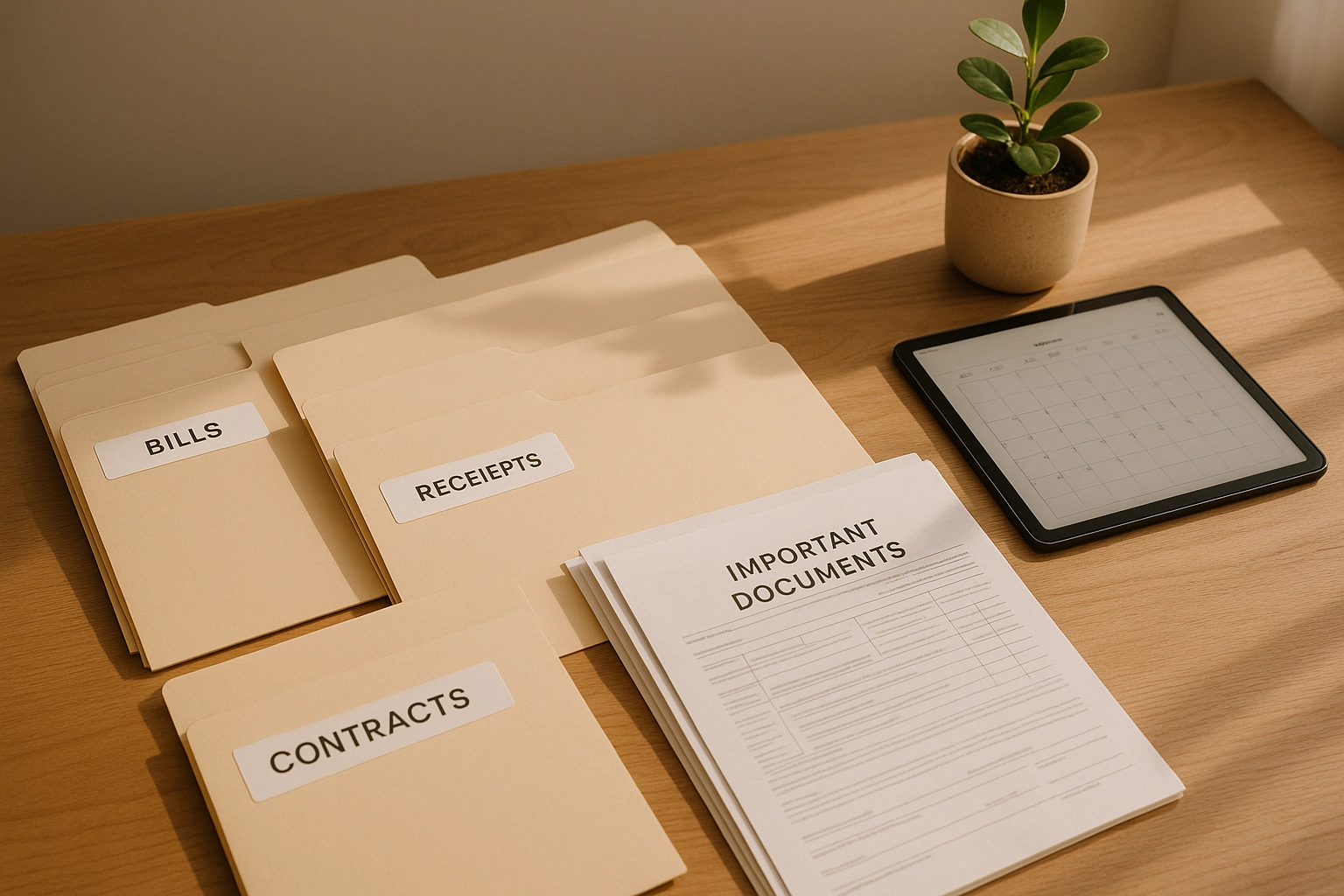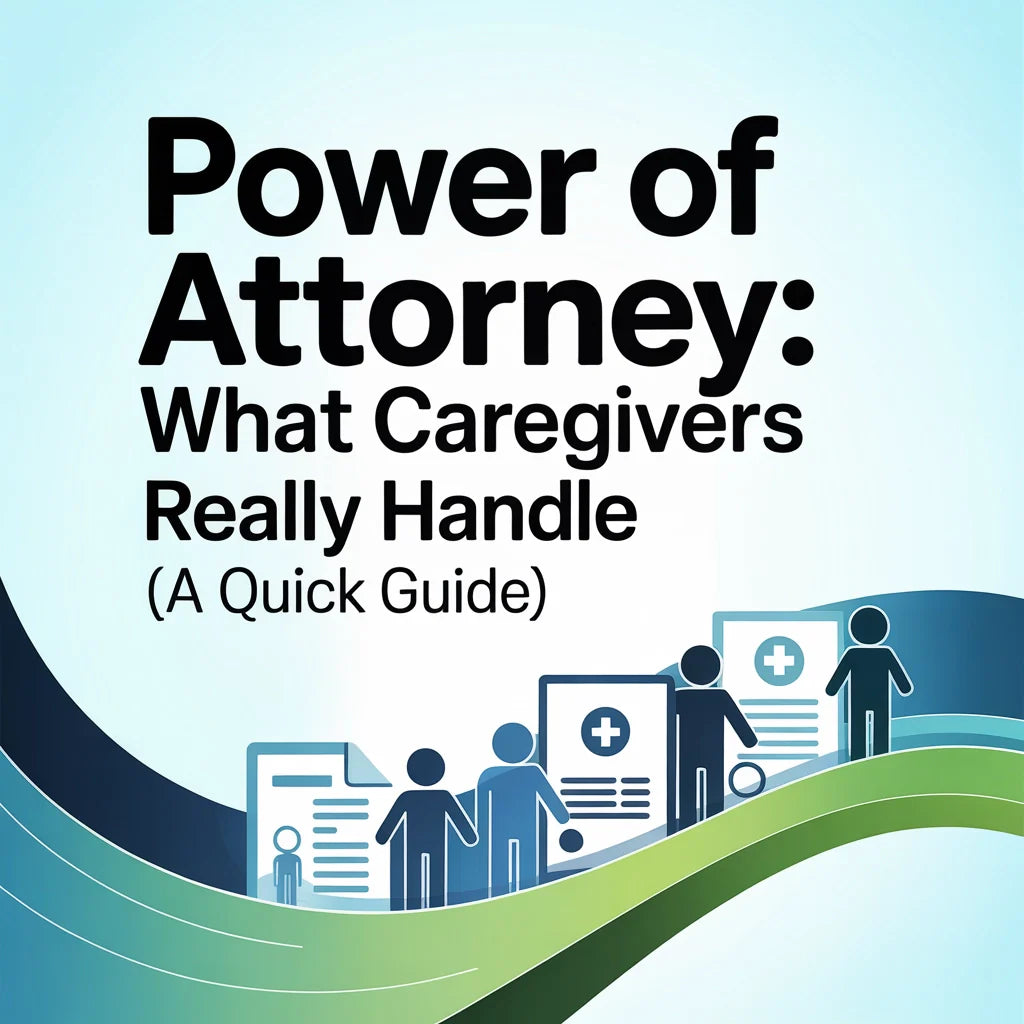Being named as someone's Power of Attorney (POA) feels like a huge responsibility: and honestly, it is. But what does it actually mean day-to-day? If you're caring for an aging parent or loved one, you're probably wondering what tasks you'll really be handling and how to stay organized through it all.
Let's break down the reality of what caregivers manage when they hold Power of Attorney, so you know what to expect and how to prepare.
What Is Power of Attorney, Really?
Power of Attorney is a legal document that gives you the authority to act on someone else's behalf. Think of it as official permission to handle their affairs when they can't: or don't want to: do it themselves.
There are different types of POA, but the most common ones caregivers deal with are:
- Financial POA - Managing money, bills, and property
- Medical POA - Making healthcare decisions
- Durable POA - Stays active even if your loved one becomes incapacitated
The key thing to remember? You're not expected to become an expert in everything overnight. Your job is to coordinate, organize, and make sure the right people are involved.

1. Managing Finances: More Than Just Paying Bills
When you have financial POA, you become the point person for all money matters. This sounds overwhelming, but it breaks down into manageable tasks:
Daily Financial Tasks:
- Paying monthly bills (utilities, insurance, rent/mortgage)
- Managing bank accounts and deposits
- Handling Social Security and pension payments
- Monitoring credit card statements
- Organizing tax documents
Bigger Financial Decisions:
- Working with investment advisors
- Coordinating with insurance companies
- Managing property sales or rentals
- Handling estate planning updates
The Reality: You're not making these decisions alone. Your role is often coordinating between your loved one (when possible), financial advisors, accountants, and other professionals. You're the organizer, not necessarily the expert.
2. Making Medical Decisions: Being the Healthcare Advocate
Medical POA means you're the go-to person when healthcare decisions need to be made. This involves a lot more communication and coordination than you might expect.
Regular Medical Tasks:
- Scheduling and attending doctor appointments
- Speaking with healthcare providers
- Managing medication schedules
- Coordinating between different specialists
- Handling insurance claims and billing issues
Difficult Decision-Making:
- Treatment options when your loved one can't decide
- Assisted living or nursing home placement
- End-of-life care preferences
- Emergency medical situations
The Reality: You'll lean heavily on medical professionals for guidance. Your job is to understand your loved one's wishes and work with doctors to make the best decisions possible.

3. Handling Day-to-Day Paperwork: The Administrative Side
This might be the most time-consuming part of POA responsibilities. There's a lot of paperwork involved in managing someone else's life.
Document Management:
- Collecting and organizing important papers
- Keeping medical records up-to-date
- Managing insurance paperwork
- Handling legal correspondence
- Maintaining POA documentation
Regular Administrative Tasks:
- Opening and sorting mail
- Filing important documents
- Updating contact information with various agencies
- Renewing policies and memberships
- Keeping detailed records of all transactions
The Reality: Good organization systems make this much more manageable. Having everything in one place saves hours of searching later.
4. Coordinating Transitions: The Big Life Changes
When major transitions happen: like moving to assisted living: POA holders coordinate the entire process.
Transition Planning:
- Researching assisted living facilities
- Coordinating tours and applications
- Managing the moving process
- Setting up new services and utilities
- Updating addresses with all relevant parties
Property Management:
- Deciding whether to sell, rent, or maintain the family home
- Coordinating with real estate agents or property managers
- Handling repairs and maintenance
- Managing belongings and downsizing
The Reality: These transitions involve multiple moving parts and lots of phone calls. Having a system to track progress on each task is essential.

5. Protecting Legal Interests: Staying Within Your Authority
Understanding your legal boundaries and responsibilities is crucial for POA holders.
Legal Responsibilities:
- Acting in your loved one's best interests
- Keeping detailed records of all decisions
- Understanding what you can and cannot do
- Maintaining confidentiality
- Avoiding conflicts of interest
When to Call in the Experts:
- Complex legal questions
- Estate planning updates
- Disputes with other family members
- Questions about your authority or responsibilities
The Reality: You don't need to be a lawyer, but you do need to understand your role and when to seek professional guidance.
Getting Organized: Your Support System
Here's the truth about POA responsibilities: they're manageable when you have the right systems and support in place.
Professional Support Team:
- Elder law attorney for legal questions
- Financial advisor for investment decisions
- Tax professional for filing returns
- Healthcare providers for medical guidance
- Insurance agents for policy management
Organizational Tools:
- Central filing system for important documents
- Calendar for tracking appointments and deadlines
- Contact list of all professionals and services
- Record-keeping system for financial transactions
- Communication log for family updates
You're Not Alone in This
Managing Power of Attorney responsibilities feels overwhelming because it is a big job. But remember: you're coordinating care, not providing expertise in every area.
The Eldercare Bundle provides comprehensive guidance through many of these tasks, helping you create systems that work and understand what to expect at each stage. Your legal, financial, and medical teams will provide expert answers to complex questions.

The key is staying organized, asking questions when you need help, and remembering that you're doing important work to support your loved one's wishes and well-being.
Ready to get organized? The Eldercare Bundle includes step-by-step guides, checklists, and templates to help you manage POA responsibilities with confidence. From creating filing systems to coordinating care transitions, everything you need is in one place.
The Bottom Line
Power of Attorney gives you significant responsibility, but it also gives you the tools to help your loved one when they need it most. With good systems, professional support, and realistic expectations, you can handle these tasks without burning out.
Remember: perfect organization isn't the goal. Getting things done in a way that supports your loved one's needs and wishes is what matters most.

